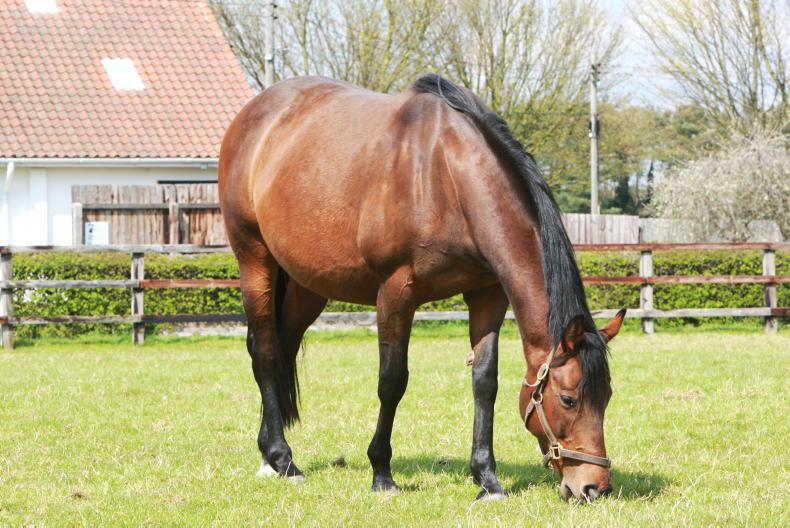UNDERSTANDING the mare’s nutritional requirements, and how best to meet them, is key for the health of both the mare and the foal.
During the last trimester of pregnancy, the equine foetus develops rapidly; over 60% of total foetal growth occurs during this period. This phase is also critical time for development of the foetal skeletal and muscular structure, as well as respiratory, endocrine and digestive systems.
To support this growth, there is an increased rate of nutrient transfer across the placenta and the mare’s requirements for most nutrients increase substantially. Dietary deficiencies during this stage can result in the mare utilising her own body reserves; resulting in weight loss, reduced birth weights and potentially an increased risk of Developmental Orthopedic Diseases (DODs) in the foal.
Similarly, early lactation presents a period of substantial physiological stress for the broodmare. The lactating mare’s nutrient needs are greater than those of any other class of horse, with the possible exception of the racehorse in training. During this time, the mare must recover from the stress of giving birth, produce milk and potentially re-breed; hence, correct nutrition is of vital importance.
Calories
During late pregnancy, the mare’s calorie requirements increase by almost 30% and by peak lactation, when the mare can be produce milk at a rate of 3% of BW/day, they will have almost doubled.
Undernutrition during pregnancy will mean that the mare ‘robs’ her own bodily stores to nourish the foetus. This will result in loss of condition, which may prolong gestation, and depletion of vital mineral stores. Loss of body reserves during late pregnancy and lactation can also result in lower colostrum quality, poor milk production and reduce re-breeding success. On the other hand, excessive weight gain during late pregnancy can lead to problems at foaling and increase the risk of issues such as laminitis.
Protein
It is critically important to meet the mare’s requirements for protein during gestation, as the foal’s birth weight is dependent to a large degree on protein deposition. Protein requirements practically double in late pregnancy and by peak lactation are almost three times higher than maintenance requirements.
Research has found that protein restriction during the last 90 days of pregnancy may reduce the ability of the new born to absorb essential antibodies from the colostrum. Studies have also shown that lactating mares fed inadequate or poor-quality protein produce less milk, and have smaller foals, compared to those fed optimal levels of high-quality protein.
Protein is made up of non-essential and essential amino acids. The latter cannot be made in the body and must be provided in the diet. Essential amino acids such as lysine and methionine play important roles in both foetal growth and milk production. Indeed, the efficiency of conversion of crude protein to milk protein is affected by the quality of the protein fed.
The main source of quality protein in Connolly’s Red Mills feed is soya, which is rich in essential amino acids.
What to feed?
The most appropriate feed for the broodmare will depend on her body condition and the quality of forage available. For example, a mare foaling early in the year (January/February) is likely to require a higher concentrate intake than a mare foaling in May/ June, when the availability and nutritional content of the pasture improves.
Most foaling outside the natural breeding season, or those prone to weight loss, are likely to require a higher concentrate feed intake.
In this case, a specific stud feed such as Connolly’s Red Mills Stud Mix or Cubes is ideal. Alternatively, if straight cereals (e.g. oats) are being fed, we recommend our Oat Balancer Mix or Pellets, which have been specifically formulated to balance the micronutrient, including the calcium to phosphorus ratio, content of cereals.
In the last month of pregnancy, when the foal occupies much of the abdominal cavity, it is common for the mare’s appetite and total feed intake to be reduced. At this point is can be beneficial to add a small amount of Connolly’s Red Mills Grocare Balancer to the ration, which provides a highly concentrated source of essential micronutrients. Foran Equine B-Complete, a highly palatable B-vitamin supplement, is also immensely useful at enhancing appetite.
If the mare becomes overweight, during later lactation or in preparation for weaning, calorie intake can be reduced by limiting the amount of Connolly’s Red Mills Stud Mix or Stud Cubes fed and adding a balancer (e.g. Grocare Balancer) to the ration.
This will ensure the mare continues to receive all the vital micronutrient, while allowing calorie intake to be adjusted according to the individual by feeding more or less stud mix/cube. Vitamins and minerals During late gestation, the foetus accumulates stores of minerals (iron, zinc, copper, manganese) in the liver to support rapid growth post-parturition. The foetus has developed this nutritional strategy because mare’s milk is quite low in these minerals.
Studies have shown that providing the pregnant mare with adequate copper is an important factor in reducing the risk of bone and joint maturation problems in the foal.
Supplementation of the foal after it is born does not have the same effect of minimizing developmental disease. Consequently, supplementation with Foran Equine Copper-Max paste, a chelated copper and zinc supplement, may be beneficial during the last trimester.
Many breeders also like to feed the pregnant or lactating mare a supplement to support foetal and early bone development.
Foran Equine’s Cal-Gro contains an ideal ration of calcium and phosphorus plus MSM, essential amino acids, chelated copper, manganese and vitamin E all of which play a role in supporting skeletal and joint health. Feeding a source of omega-3 fatty acids, for example, Foran Equine Kentucky Karron Oil to mares during late pregnancy and lactation is also beneficial, as it has been shown to improve colostrum quality.
